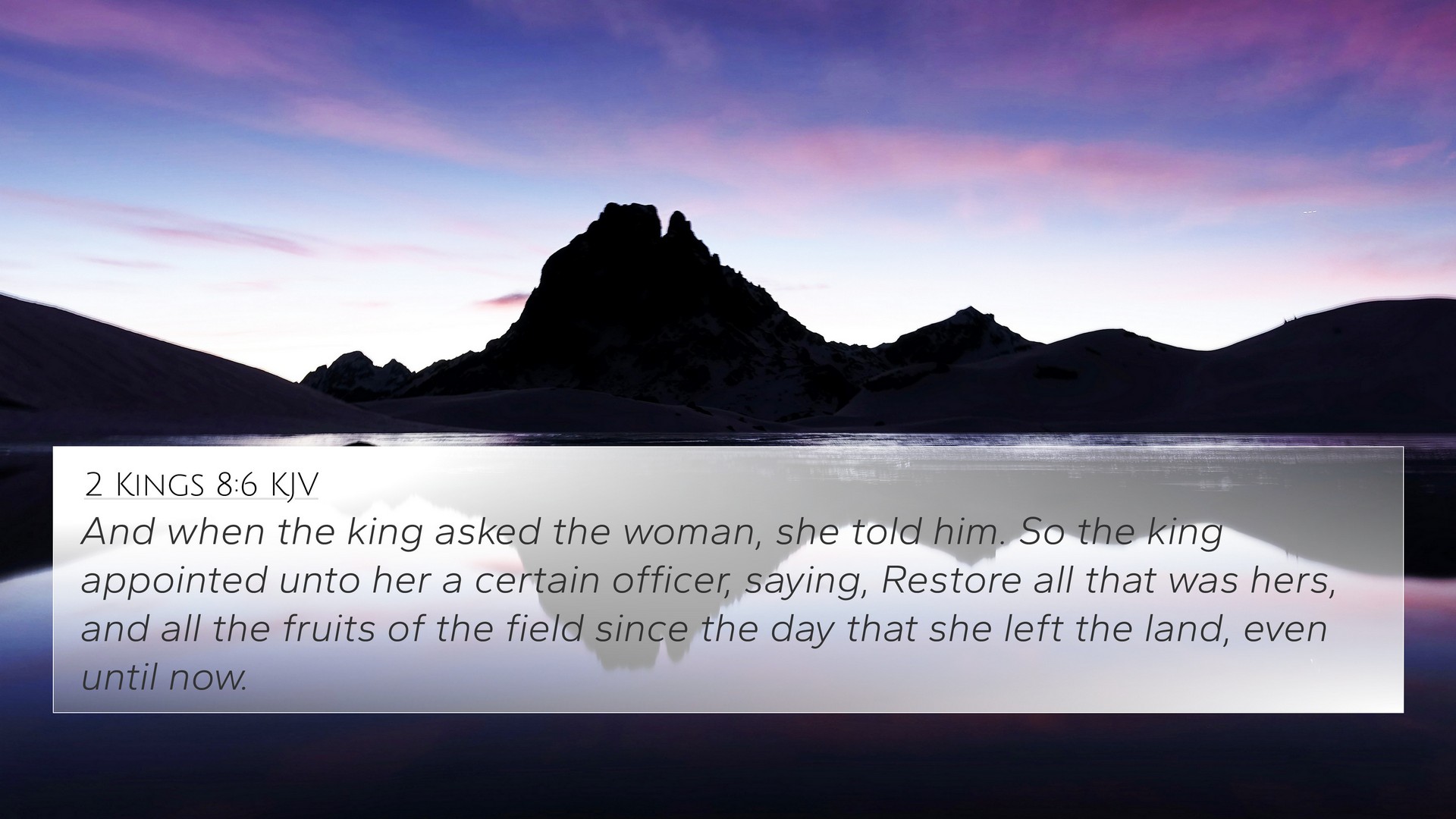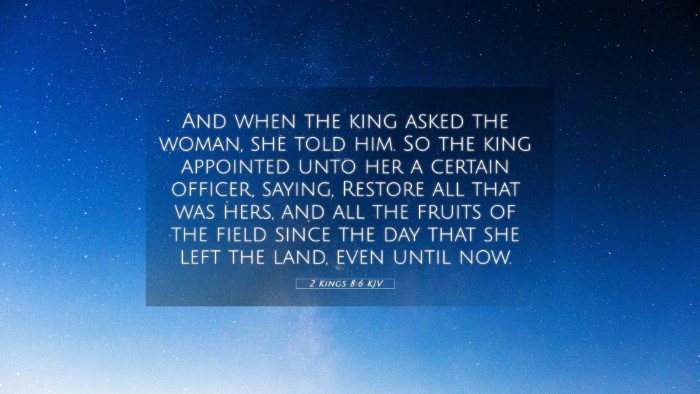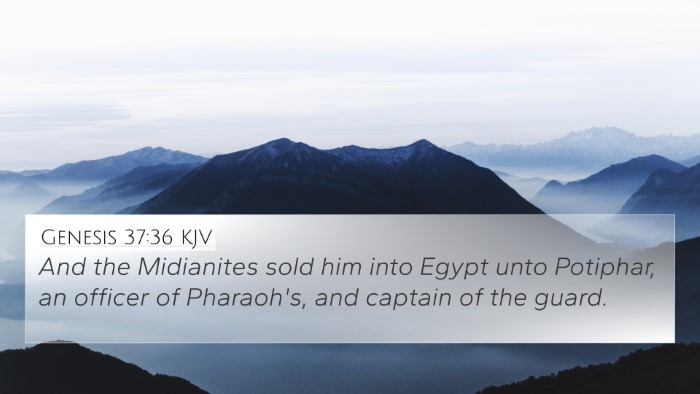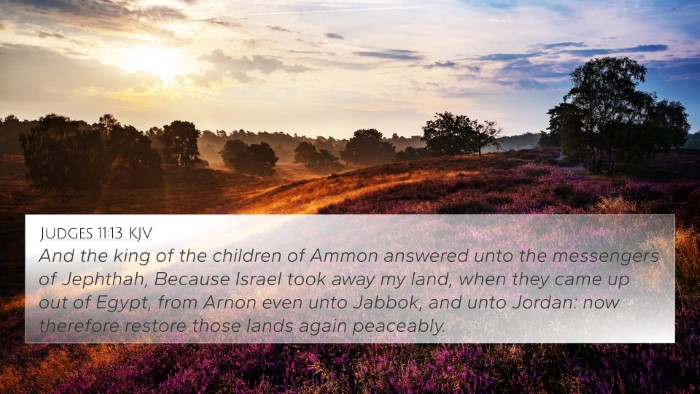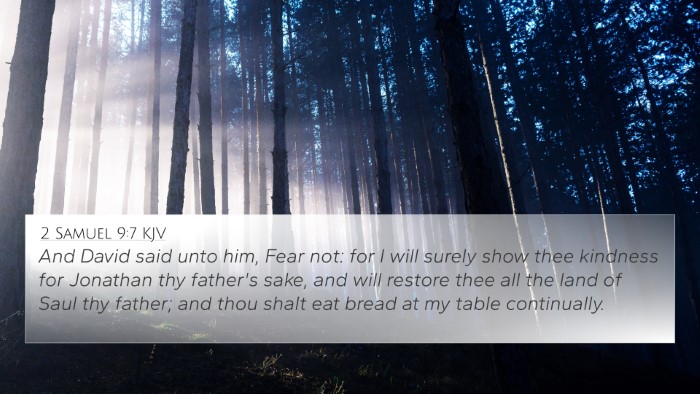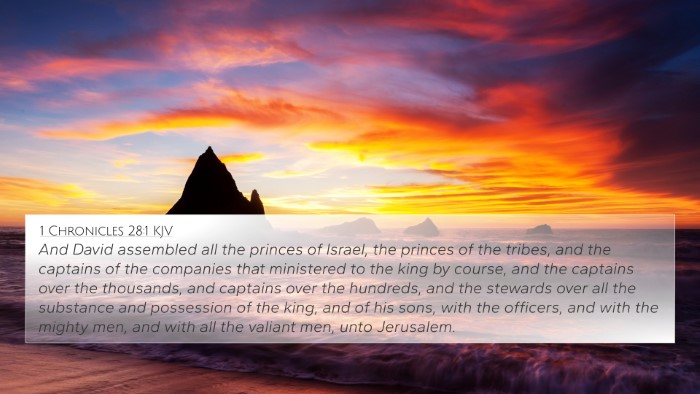Understanding 2 Kings 8:6
2 Kings 8:6 discusses a significant event in the interaction between the monarchs of Israel and Judah, highlighting the themes of divine providence and national destiny. In this verse, we find the Shunammite woman who, having received restoration from the prophet Elisha, appeals to the king for her home and property after living in the land of the Philistines for seven years.
Summary of the Verse
In this account, the king acknowledges her plea and orders her land to be restored. This interaction serves as a profound example of God's provision and the importance of divine timing.
Commentary Insights
Matthew Henry's Commentary
Matthew Henry emphasizes the providence of God throughout this narrative. He points out that the woman's actions—her return after absence—and her appeal to the king is indicative of faith in God's care. The recovery of her home signifies not just restoration of property but also the principle that God can and will restore what is lost to His people.
Albert Barnes' Commentary
Albert Barnes notes the significance of the Shunammite woman’s story in the broader context of biblical history. He elucidates how her relationship with Elisha mirrors the relationship of believers with God's prophets. Barnes further discusses that the king's decision to restore her property demonstrates the Israelites’ need for justice and caring leadership.
Adam Clarke's Commentary
Adam Clarke brings attention to the socio-political ramifications of the Shunammite woman's request. He explores the cultural context, emphasizing that her boldness before the king showcases her social standing and the respect Elisha commanded as a prophet. Clarke also notes that this verse reflects themes of mercy and social justice—qualities that are essential in biblical leadership.
Thematic Connections
This verse creates connections with several other biblical passages, highlighting themes of restoration, divine provision, and the importance of faith. Below are some thematic Bible verse connections:
- Isaiah 61:7 - Promises of restoration for God’s people.
- Job 42:10 - The restoration of Job after his trials, demonstrating God’s redemptive power.
- Luke 8:3 - The role of women in supporting Jesus’s ministry, reflecting acts of faith similar to the Shunammite's.
- James 5:16 - The effective prayer of the righteous avails much, paralleling Elisha's intercessory role.
- Psalm 126:1 - A song of restoration that resonates with the Shunammite's joyful reclaiming of her life.
- Amos 9:14 - God promises restoration of the fortunes of His people, similar to the Shunammite’s request.
- Matthew 19:29 - Assurance of rewards for those who sacrifice for the sake of the kingdom, reflecting her faith journey.
Cross-Referencing Biblical Texts
Understanding the elaborate architecture of the scripture can deepen our appreciation and comprehension of God's overall narrative. By applying tools for Bible cross-referencing, we can trace the connections and thematic continuities between various passages. Here are some approaches:
- Bible Concordance: Utilize a concordance to find related themes or words and trace them through the Scriptures.
- Cross-Reference Bible Study: Implement a systematic study using specific themes to uncover parallels across different books.
- Bible Reference Resources: Access comprehensive and detailed reference materials to aid in finding connections quickly.
- Bible Chain References: Engage with thematic chains that showcase how specific themes evolve throughout scripture.
Related Bible Verses
When seeking more insights and understanding about the meaning and implications of 2 Kings 8:6, consider exploring the following Bible verses:
- Exodus 22:1 - Addresses restitution and property boundaries.
- Jeremiah 30:3 - The promise of restoration for Israel and Judah.
- Galatians 6:9 - Encouragement to keep doing good, resonating with the Shunammite's faith.
- 1 Peter 5:10 - Assurance that suffering leads to restoration and strength.
Conclusion
2 Kings 8:6 offers rich insights into God's providence, the dynamics of faith, and the importance of restoration. Through comparing various biblical sources and themes, we can see the overarching narrative of hope and divine justice manifesting throughout scripture. Utilizing cross-referencing methods enhances our understanding and appreciation of how interconnected the verses are and God’s faithfulness in fulfilling His promises.
